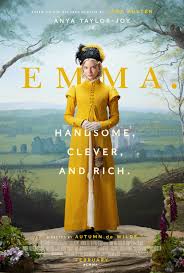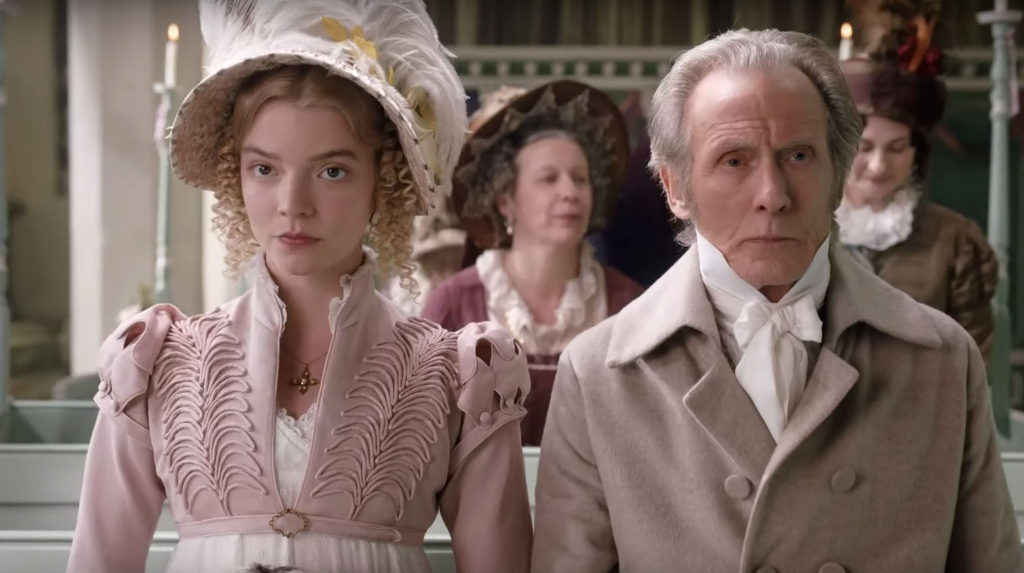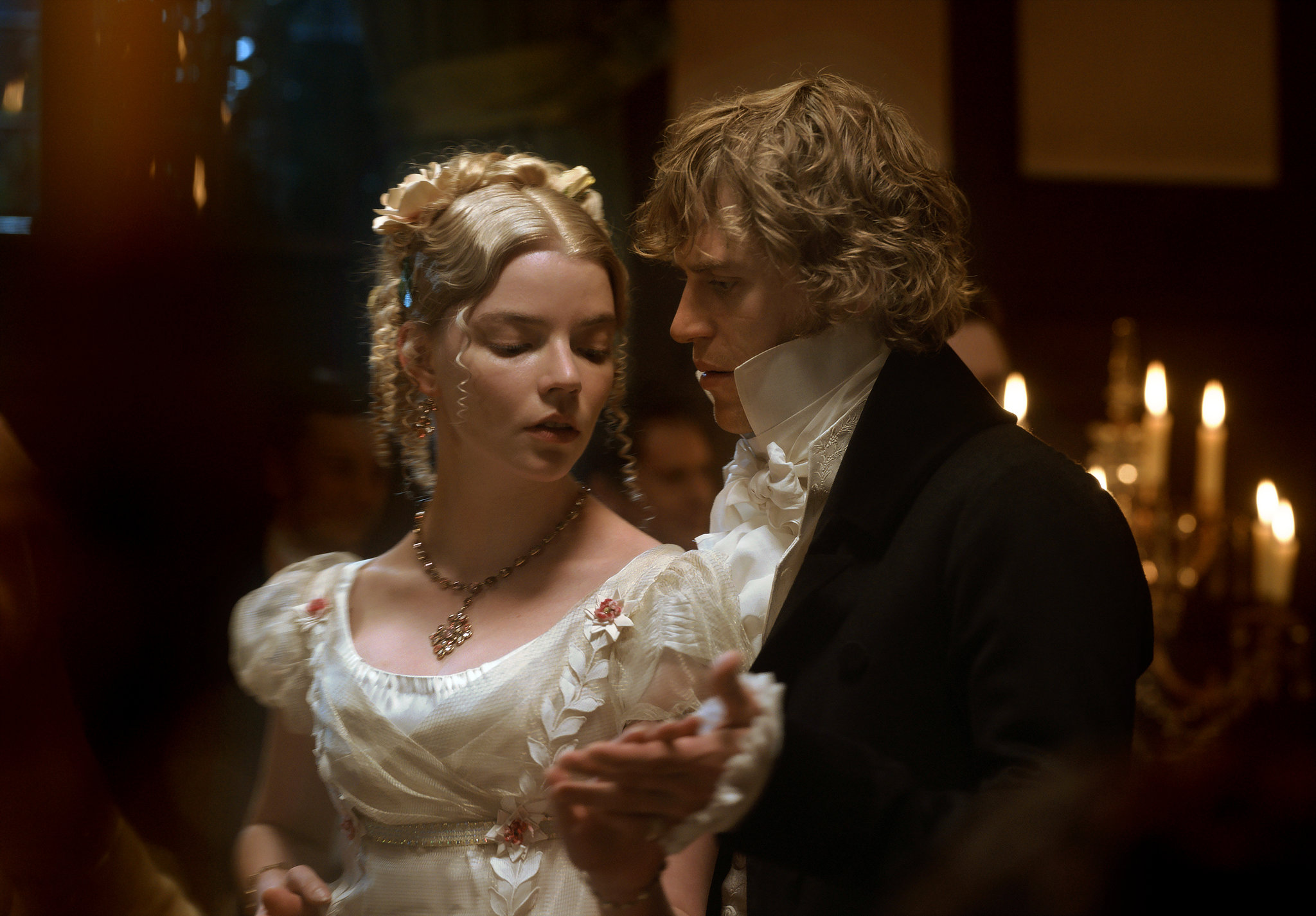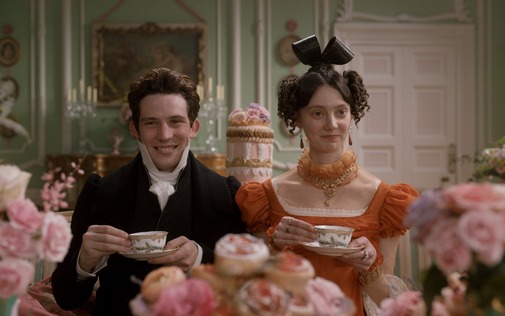Review: The new "Emma."
 Tuesday, March 10, 2020 at 1:00PM
Tuesday, March 10, 2020 at 1:00PM  by Lynn Lee
by Lynn Lee
Now that we’ve revisited past Emma adaptations like 1996's Miramax release and 1995's Clueless, courtesy of Claudio, it’s time to turn our attention to the latest version, which just went wide last week. It’s a production of relative newcomers, marking the directorial and screenwriting debuts, respectively, of photographer Autumn de Wilde and Booker Prizewinning New Zealand novelist Eleanor Catton, and starring a cast of mostly fresh faces headed by rising star Anya Taylor-Joy (The Witch). Whatever it’s lacking in big names it certainly makes up for in indie credit.
The result is an Emma that’s bright, fun, and funny – not attaining the sublime heights of Clueless but more successful than the 1996 Miramax version with Gwyneth Paltrow...
This adaptation is also extremely pretty to look at, thanks to cinematographer Christopher Blauvelt (go-to DP for Kelly Reichardt, including the newly released First Cow), who creates a pastoral and pastel-dominated milieu that resembles half Watteau painting, half macaron shop, and the equally colorful period-but-playful costumes by Alexandra Byrne (Mary, Queen of Scots, both Elizabeths, and multiple Marvel movies) that periodically punctuate all the prettiness with comic visual gags.

And while the film remains faithful to the source material, it brings a subtly modern female perspective to Austen’s only story about a wealthy and socially powerful young woman – albeit one who needs to learn to use her power more wisely.
Playing a protagonist Jane Austen herself described as “a heroine whom no one but myself will much like,” is a challenging task for any actress, as Claudio’s already noted. Although Emma need not, in fact probably should not, be too likable, she has to be amusing and ultimately sympathetic, and Taylor-Joy adeptly pulls off that balance here. At first there’s something a little unsettling, even off-putting, about her almost unnaturally wide, sharply probing eyes and knowing expression. She looks like the cat that swallowed the canary, signaling everything Emma’s subsequent behavior confirms: a conviction as deep as it is wrong that she can order not just her own life but the lives of everyone around her, and that everyone will be better for it. After all, all she’s had success so far managing both her hypochondriac father (Bill Nighy) and her unusually pliant governess (Gemma Whelan); why shouldn’t she take in hand and make a good match for her even more pliable new friend Harriet Smith (Mia Goth)? But as Emma’s plans, one after the other, blow up in her face, we see that air of smug self-satisfaction gradually crumble and dissolve, exposing all her inner vulnerabilities and feelings she never even knew she had.

Taylor-Joy is also well paired with actor/singer Johnny Flynn as George Knightley, Emma’s brother-in-law and (technically a spoiler, I guess?) soulmate-though-she-doesn’t-know-it-yet. Mr. Knightley is in some ways a difficult love interest to sell on screen, as he spends most of the story as an older-brother-knows-best type whose main role is to provide family support but also to keep Emma’s ego in check and figuratively rap her knuckles when she does something silly or mean. (The fact that he’s nearly always right both decreases and exacerbates the difficulty.) Like the 1996 Miramax version and, of course, Clueless, this adaptation skirts the problem by casting someone with plenty of sex appeal and non-brotherly chemistry with Emma. Flynn conveys Knightley’s deep if complicated attraction to her every time he looks at her, even as he affects a disapproving semi-scowl that ends up registering as more of a Mr. Darcy-like smoulder.
At the same time, the film notably places nearly equal weight on Emma’s relationship with Harriet Smith, a character who can too easily come across as a dimwit. Goth’s Harriet is much more interesting, starting out as the naïve girl dazzled by Emma’s attention who succumbs with comic entirety to her influence, but ultimately showing unexpected emotional depths that make her more than just a pawn or punchline. De Wilde has made it clear in interviews that the focus on this female friendship was deliberate, and it, too, helps humanize Emma. Unlike the novel, which heavily signals that Emma and Harriet were never meant to be close long-term friends – mainly for class reasons – this film version manages to wrest something more meaningful out of their intimacy than mere youthful folly.
Not all of this Emma’s choices work quite as well. The portrayal of the unctuous vicar Mr. Elton (Josh O’Connor) and his wife (Tanya Reynolds), errs on the side of being overly broad, in lieu of the more pointed satire of social climbing presented in the book. By contrast, British comedic treasure Miranda Hart is comparatively underutilized as poor local spinster Miss Bates, although she does get a hugely impactful, not at all funny gut punch of a scene that elicited actual gasps from the audience I watched the movie with and that marks the beginning of the end of Emma’s superiority complex. The film also doesn’t seem very interested in the characters of Emma’s foil, the accomplished but reserved Jane Fairfax (Amber Anderson), or Emma’s dashing but unreliable potential suitor, Frank Churchill (Callum Turner), although their lack of development is hardly limited to this particular adaptation. In fact, every time I read or see a version of Emma, I find myself wondering what a retelling of the story from Jane Fairfax’s point of view would look like. More Charlotte Brontë and less Jane Austen-y, perhaps, which might be rather intriguing.

We’re in Austen land, however, and overall I think she would be pleased with this adaptation of her most complex and intricately designed novel. Like its heroine, it’s handsome, clever, and rich, witty and at times exasperating. But also like her, it progresses organically to a greater maturity and grace that make the journey worthwhile.



Reader Comments (9)
Clueless has aged so poorly. I watched it the other week and was absolutely shocked. Looks like a commercial at this point.
Johnny Flynn is a snack.
This film looks like something out of a Wes Anderson film, with the wit of Walt Stillman. I would recommend it
I hate to say it because I like her (loved The Witch) but I thought ATJ totally missed the mark on this one. I get that the character of Emma is supposed to be a pain to everybody around her but here she comes off like a total sociopath. I was afraid for her friends and loved ones.
Miranda Hart was the stand out for me. She's always SO funny and yes, her gut punch scene also elicited gasps from the audience and just... OOF it hit perfectly.
But ATJ/Flynn have great chemistry. I needed to hydrate after their dance scene.
Saw this a couple of weeks ago and really enjoyed it. Agreed that moment with Miranda Hart had me gasp aloud in the theater.
Would have liked a little more development with the supporting characters; the subplot with Frank Churchill and Jane Fairfax seemed a bit undercooked as presented in the film. (I kept losing focus and wondering if it was going to be revealed that Churchill was gay, ala Christian in Clueless, but of course, that’s not actually in Austen’s text.)
On the other hand, Mia Goth was quite the revelation for me. She had some great layers to add to an otherwise sweet and simple character.
And agreed with Tyler: Johnny Flynn was quite lovely and added a lovely gruffness to this film. There’s something slightly off about him, which totally draws me in. Like a slightly more attainable Charlie Hunnam.
I'm not voting for Biden.
@HardyofHearing - I personally find Flynn much more interesting/appealing than Hunnam, but I do agree that there's a resemblance. :)
Hoping it gets remembered for
Original Song - Queen Bee
Production Design
Costume Design